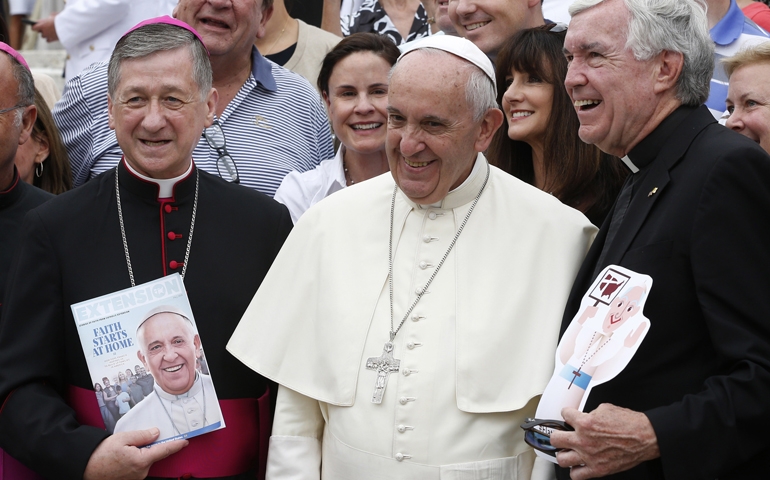Pope reconnects with Vatican Council II
Ever since his election, Francis has insisted that the world is currently involved in World War III. He’s argued that this inter-continental conflict is being waged “piecemeal” in various parts of the planet.
May 12, 2017

By Robert Mickens
Ever since his election, Francis has insisted that the world is currently involved in World War III. He’s argued that this inter-continental conflict is being waged “piecemeal” in various parts of the planet. And there can be no denying that religion (or as the Pope would say, the abuse of religion) is being used to justify much of the slaughter.
And so, as the most prominent religious leader on earth, the Pope continues to feel a clear responsibility to make himself vulnerable (just as Jesus did) in an effort to reconcile our fractured and manipulated humanity.
The Pope sees this as part of his global mission beyond the boundaries of the Roman Church. And, despite his eighty years of age, he has embraced it with surprising energy, a sense of urgency and, yet, with a calm and trusting demeanour.
The papal visit to Cairo was billed as a success on many fronts. Still, it will take time before we see if Francis’ quest for a joint Christian-Muslim project against religious fanaticism takes root and grows.
As often happens in our media-crazed world, major events of the past twelve hours (or last five minutes) tend to relegate those things that have preceded them (even when of great importance) to the trash bin.
Unfortunately, the Pope’s trip to Cairo did just that, by overshadowing at least a few significant developments recently at the Vatican.
The first was the latest round of deliberations that Pope Francis held with his Council of Cardinals (C9), the nine men in red who advise him on questions of Church governance and re-configuring the Roman Curia.
The April 24-26 gathering was the nineteenth since the Jesuit Pope instituted the novel idea of having a “kitchen cabinet” or privy council. And many reform-minded Catholics have expressed hope that he, and his aides, will radically alter the nature and composition of the Vatican’s central offices.
The Bishop of Rome is the head of the Synod and that is why the general secretariat is located here in the Eternal City. But it is an international institution and, technically, not part of the Roman Curia, even if it is treated as such and has been, de facto, controlled by the curia up until Francis’ election. The Pope still needs to make more juridical changes to the Synod so that it truly replaces the Vatican bureaucracy as the main institution through which he exercises his universal pastoral authority and service.
But one thing it tells us again about Francis is that, as Cardinal Donald Wuerl of Washington said recently, this Pope is “reconnecting” the Church “with the energy of the Second Vatican Council, the energy coming out of that council.”
Vatican II pulled down the sectarian walls behind which the Catholic Church had long taken refuge. It rediscovered and deepened the real consequences of our Christian belief in the incarnation of Jesus Christ and how that demands us to be involved in the world, and not stand apart from it.
Leading by example, that’s exactly what Pope Francis did by leaving the safe and comfortable confines of the Vatican to go to Cairo.--Commonweal Magazine







Total Comments:0